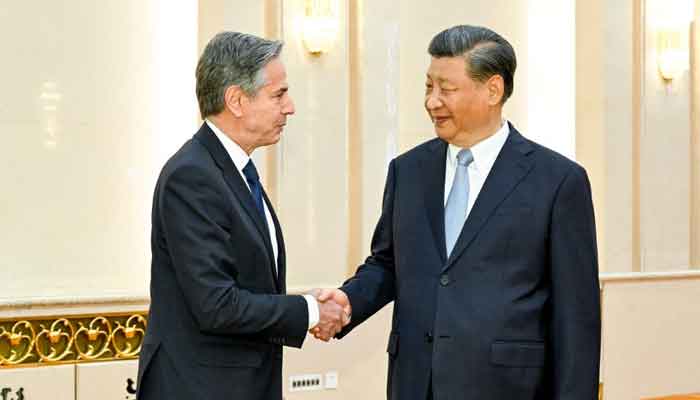[ad_1]

- Antony Blinken’s visit is first by any US top diplomat since 2018.
- Chinese leader received Blinken at the Great Hall of the People.
- Xi Jinping hails progress achieved during rare visit.
BEIJING: President Xi Jinping on Monday termed the progress achieved in the US-China talks “very good” as the US Secretary of State Antony Blinken concludes his landmark visit to Beijing on a high note.
The meeting between the two leaders was the final engagement of a rare trip aimed at ensuring disputes between the superpowers do not spiral into conflict.
Blinken, the first holder of his post to meet the Chinese leader since 2018, had earlier strode towards Xi with his hand outstretched at the Great Hall of the People, a venue China often uses for greeting heads of state – positive signals in the choreography of diplomacy.
The two delegations then faced each other across a long conference table bedecked with pink lotus flowers, with Xi at the head and Blinken just to his right.
Their roughly 30-minute meeting could help facilitate a summit between Xi and US President Joe Biden later in the year.
Biden and Xi last met on the sidelines of the G20 summit in Bali, Indonesia in November, pledging more frequent communication, although ties since then have deteriorated over issues ranging from Taiwan to espionage concerns.
“The two sides agreed to follow through the common understandings President Biden and I had reached in Bali. The two sides have also made progress and reached the agreement on some specific issues. This is very good,” Xi said at the start of the meeting in a video posted online by Chinese state television.
During the otherwise closed-door talks, Xi said China “hopes to see a sound and steady China-US relationship” and believes that the two countries “can overcome various difficulties”, according to a readout by China’s state news agency Xinhua.
He also urged the US not to “hurt China’s legitimate rights and interests”.
It was not immediately clear from Xi’s remarks or previous readouts of Blinken’s earlier discussions with China’s top diplomat Wang Yi on Monday and foreign minister Qin Gang on Sunday, exactly what progress had been made.
Earlier, Blinken underscored the importance of open communication channels to manage their competition during more than three hours of talks with Wang, which the State Department called “productive”.
Describing the US-China relationship as being at a low point, Wang said the root cause was the United States’ wrong perception of China.
“We must take a responsible attitude toward the people, history and the world, and reverse the downward spiral of US-China relations,” Wang said during the meeting with Blinken, according to a statement released by China’s foreign ministry.
The lack of regular and open communication channels between the world’s top two economies has sent jitters around the world, and Beijing’s reluctance to engage in regular military-to-military talks with Washington has alarmed China’s neighbours.
During 7-1/2 hours of talks with Qin on Sunday, Blinken stressed “the need to reduce the risk of misperception and miscalculation”, the State Department said.
Both sides emphasised the importance of making it easier for their citizens to visit, and agreed on working to increase passenger flights, which boosted Chinese airline shares.
They also expressed a desire to stabilise bilateral ties despite what one US official called their “profound” differences, and agreed that Qin would visit Washington to continue the conversation, though no date was announced.
“This is going to be a process of sustained diplomacy,” one senior State Department official, speaking on the condition of anonymity, said on Sunday.
Blinken’s trip, which was postponed in February after a suspected Chinese spy balloon flew over US airspace, is closely followed worldwide as further deterioration of ties could have global implications on financial markets, trade practices and routes and supply chains.
Taiwan core issue
Beijing’s tone on Taiwan, the democratic island Beijing claims as it own, has been particularly pointed throughout Blinken’s visit. Wang said “China has no room for compromise or concessions”, according to the Chinese readout.
The United States has long stuck to a policy of “strategic ambiguity” over whether it would respond militarily to an attack on Taiwan, which Beijing has refused to rule out.
When asked last year, US President Joe Biden said Washington would defend Taiwan in the event of a Chinese invasion, though aides later said his comments did not reflect a policy departure from the long-standing “one China” policy.
US officials have underscored that the United States does not support Taiwan independence.
The Chinese readout of Sunday’s meetings described them as constructive but made clear that Taiwan is the most important issue, and a potentially dangerous one.
“Qin Gang pointed out that the Taiwan issue is the core of China’s core interests, the most important issue in Sino-US relations, and the most prominent risk,” Chinese state media quoted Qin as having told the top US diplomat.
US officials have been playing down the prospect of a major breakthrough in talks, but they and analysts expect Blinken’s visit will pave the way for more bilateral meetings in coming months, including possible trips by Treasury Secretary Janet Yellen and Commerce Secretary Gina Raimondo.
[ad_2]
Source link






